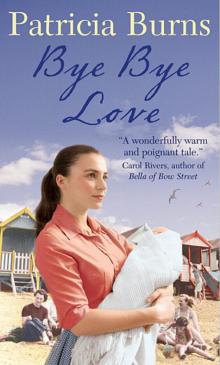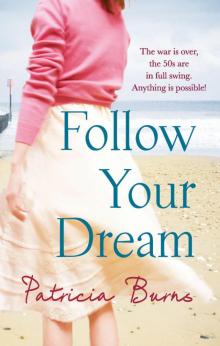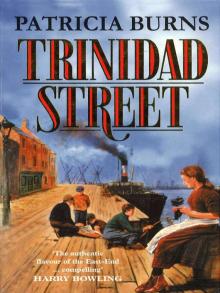- Home
- Patricia Burns
We'll Meet Again Page 3
We'll Meet Again Read online
Page 3
Then there was a sudden flutter and squawk from the hens, and out of the barn came her father. He stopped when he saw her and fixed her with his pale blue eyes.
‘You’re late,’ he said.
CHAPTER THREE
ANOTHER long day of work was done and the last chores in the farmyard were finished. Annie looked in at the kitchen door. Her mother was sitting at the big table, turning the wheel of her sewing machine. The needle flew up and down so fast that it became a blur, while her mother fed the long side seam of a green silk dress beneath it.
‘Mum?’ Annie asked. ‘You all right? You need me to do anything?’
‘No—no—’ Edna Cross did not take her eyes from the slippery fabric. ‘Just want to get this done before Mrs Watson comes for her fitting tomorrow.’
‘I think I’ll go out for a bit, then.’
‘All right, dear.’
Annie slid out of the porch, ran across the yard and away down the track before her father could see what she was doing. Once over the gate into the first field, she slowed to a walk. She felt physically light, as if she might bounce along if she wanted to. For a short while, until it got dark and she had to go back indoors, she was free.
She headed automatically for the sea wall. It was no use looking at Silver Sands, for a big family had moved in two days ago for a holiday. Even from here she could see the two little tents they had put up in the garden because the chalet wasn’t large enough to accommodate them all. But it would be all right the other side of the wall. That was one advantage of the barbed wire—it kept people off the beach. Nobody but her liked to sit on the small bit of sand between the wall and the wire.
It was a beautiful summer’s evening, warm and still. Annie dodged the cow-pats and the thistles, singing as she went.
‘Wish me luck as you wave me goodbye …’
The one big bonus of the war, as far as she was concerned, was that her father had gone out and bought a wireless so he could listen to the news each evening. Which meant that they could also listen to Henry Hall and Geraldo, and her mother could have Music While You Work on. Now she knew all the latest songs just as soon as Gwen did.
As she came nearer to Silver Sands, she could see the family there out in the garden. She felt drawn to study them. There were two women—Mum and Aunty, maybe?—sitting on the veranda knitting, together with a man reading a newspaper, while a bunch of children all younger than herself were running round the bushes and up and down the steps in a game of ‘he’. Annie skirted the garden, wishing there was another way on to the sea wall, but you had to walk a long way away from the town before you got to the bridge over the wide dyke that ran along behind the wall. There were shrieks from the children as someone was caught, and then yells of, ‘Joan’s It! Joan’s It!’ Annie wondered what it would be like to have a holiday. It must be nice to be able to play all day long like those children. Not that she was wanting to run around playing now, of course. She was too grown up for that. But she would have liked it when she was little.
She ran up the sea wall, stopping at the top to look about.
‘Oh!’ she said out loud.
For there, just below her on the seaward side of the wall where nobody ought to be, was a boy a year or so older than herself with a sketch-book on his knee.
If he had heard her, he made no sign of it, but just kept on glancing at the sea then looking down at his paper and making marks. Fascinated, Annie looked over his shoulder. He was making a water-colour sketch. The sky was already done and, as Annie watched, he ran layers of colour together to make the sea, leaving bits of white paper showing through so it looked like the low sunlight reflecting off the waves. He made it look so easy, so unlike the clumsy powder paint efforts that she had occasionally been allowed to do at school.
‘That’s ever so good,’ she said before she could stop herself.
The boy turned his head, screwing up his eyes a little to see her as she stood against the light.
‘Oh—’ he said. ‘Hello. I mean—thanks. I thought you were one of my beastly kid cousins creeping up on me.’
He had an angular face with broad cheekbones, and very dark hair cut in a standard short-back-and-sides, but what struck Annie most was his unfamiliar accent—something she vaguely identified as being northern.
‘No,’ she said.
Now that she had started the conversation, she wasn’t quite sure what to say next.
‘You an artist?’ she blurted out, and instantly curled up inside with embarrassment, because how could he be an artist? He wasn’t old enough.
But, to her relief, instead of laughing, he took her question seriously.
‘I want to be. But I don’t know whether I’m going to be good enough.’
‘But you are! That’s lovely!’ Annie cried.
He shook his head. ‘Not really. The colours aren’t right.’
‘They are—well, nearly,’ Annie said, sticking to the truth. ‘And it’s—’ She stopped and considered, her head to one side. She’d never really looked at a painting before, not a proper one. She had no words to describe what she thought about it. ‘It’s like—moving. Yes—that’s it. The sea’s sort of moving—’
It sounded daft, put like that, because paint didn’t move. But the boy’s face lit up. He had an infectious smile.
‘Really? You think so?’
Glad that she’d hit the right note, Annie grinned back. Without thinking about it, she came and sat down by him. He was dressed in a blue short-sleeved shirt, khaki shorts and plimsolls. His arms and legs were long and skinny. His nose was peeling.
‘I do, honest. I think it’s good,’ she assured him. ‘Are you going to put the pier in? And the wire?’
‘When it’s dry I’ll draw the pier in Indian ink, so I’ll be able to get all the little details. I don’t know about the wire. I think I might do another one, without the pier, just sea and sky and the wire across it.’
Annie nodded slowly, seeing it in her head. ‘Yes, sort of … like a prison—’ The boy turned and gave her a long, considering look.
‘Yes,’ he said. ‘That’s just it. It’s supposed to be keeping the Jerries out, but if you look at it the other way, it’s keeping us in.’
‘But if you look through it—sort of fuzzy your eyes—you know? You can pretend it isn’t there at all,’ Annie said.
Which brought on that dazzling smile again.
‘Yes! That’s what I’m doing right now! Just—making it go away. How did you know that?’
‘I do it a lot,’ Annie told him. ‘Pretending things aren’t there. Or people. It’s better like that.’
‘And how,’ the boy said.
They looked at each other, breathless, startled by that heart-stopping moment that revealed a kindred spirit.
‘I’m Tom. Tom Featherstone.’
That intriguing accent. The way he said ‘stone’.
‘Annie Cross.’
Self-consciously, they shook hands. Tom put down his sketch-book and brushes.
‘Are you here on holiday?’ she asked.
‘Mmm. At the chalet.’
‘Silver Sands?’
If it had been anyone else, she would have resented them being in the place she wanted for her own retreat, but with Tom it was different.
‘S’right.’ he said. ‘You?’
‘I live at the farm. Marsh Edge. Over there.’
She pointed her thumb over her shoulder.
‘Oh—that farm. We can see it from the garden. I wondered who lived there.’
‘I wondered who the family was at Silver Sands. I saw the tents in the garden. I thought—I thought it must be nice, to have a holiday, and lots of people to play with. If you’re a little kid, of course.’
‘They’re pests, my cousins,’ Tom said. ‘They’re all younger than me. My sister Joan’s five years younger than me, and my cousin Doreen’s only a year younger than her, so they’re friends, and then the twins, that’s Doreen’s brothers, they’re alwa
ys together anyway. I came over here to get away from them.’
It was all falling into place.
‘Who are the grown-ups? They your mum and dad?’
‘My mam and Aunt Betty and Uncle Bill. My dad had to stay at home and mind the business.’
Mam. She liked that.
‘Where’re you from?’ she asked.
‘Noresley. It’s near Nottingham.’
Nottingham. Annie pictured the map of England in her head. They’d traced it and put in all the boundaries and principle towns and cities in Geography a couple of years ago. Nottingham was just about in the middle. The Midlands.
‘Where Robin Hood came from?’
‘Sort of. We’re not in Sherwood Forest, though. It’s all pit villages round our way.’
‘Pits? You mean coal mines?’
Miners were one of her father’s many dislikes. They were all good-for-nothing commies in his opinion.
‘That’s right. We run a bus and coach company, in and out of Nottingham and Mansfield, and between the villages.’
Annie thought of being out and about all the time, driving from one place to another, talking to all the people getting on and off the bus.
‘Sounds like fun. Are you going to drive a bus when you’re older?’
Tom sighed. ‘I suppose I’ll have to. I can’t really see my dad letting me go to art school. Depends, though, doesn’t it? If the war’s still going on by December next year I’ll be joining up.’
‘D’you think it’ll go on that long?’
‘Last one did, didn’t it? It went on for four years.’
‘Four years! I’ll be eighteen then.’
Eighteen. It seemed a huge age. And where would she be then? Still here at Marsh Edge Farm, probably. Or … Annie looked at the barbed wire that was supposed to keep the Germans out and a dreadful thought struck her.
‘Do you think they will invade?’ she asked.
It had never really presented itself as a possibility before. It was something lingering on the edge of imagination, like a past nightmare. Now she saw waves of grey-uniformed soldiers coming ashore, cutting through the wire, marching over the fields—her fields—towards her home. Fear sliced through her.
‘I don’t know,’ Tom said. ‘We’re winning the Battle of Britain so far. Our planes are shooting down more of their planes. We can’t lose, can we? I mean—we just can’t—’
‘No,’ Annie agreed. ‘We can’t.’
They both stared through the wire to the horizon. The fear subsided, but still lurked there.
There was a rustling and panting on the other side of the wall, and then two shrill voices broke through their reverie.
‘Tom! Tom! Your mam says you’re to come in, she’s making the cocoa.’
Annie turned round. Two small boys with identical round faces, grey eyes and grubby knees were staring at her.
‘Who’s she?’ one of them asked.
‘Never you mind. Go and tell my mam I’m just coming,’ Tom told them.
The twins stood and gazed.
‘What’s she doing here?’ the other one asked.
‘Talking. Now buzz off. Now! Hop it! Go!’ Tom ordered.
Giggling, they went.
‘Brats,’ Tom grumbled.
‘I thought they were quite sweet,’ Annie said.
Their likeness was fascinating.
‘Huh. You don’t have to share a tent with them,’ Tom said.
He washed his brushes, emptied his water jar, closed his paint box. While they had been talking, the light had faded. It was dusk.
‘You—er—you going to be here at all tomorrow?’ he asked, not looking at her.
‘I’ve got to work. But I might be able to get away in the evening again. I might,’ Annie said, knowing as she said it that she would move heaven and earth to do so.
‘Come over this side again. Where that lot can’t see us,’ Tom said, indicating his family with a backward movement of his head. ‘If you want to, that is.’
‘Righty-oh. If I can,’ Annie said. ‘Bye, then.’
Tom looked at her now and smiled—a shy smile.
‘Bye, Annie.’
She ran all the way home in the gathering dark, inches above the ground.
CHAPTER FOUR
THE sun was already warm on the roof of the small ridge tent. The twins, as usual, were sprawled over far more than their share of the space. The elbow of one of them was jabbing in Tom’s ribs while the foot of the other was dangerously near to his face. They both had sleeping bags made of old blankets held together with large safety pins, but neither of them seemed able to stay inside them. But at least they were still asleep. Once awake, they were liable to start their favourite game of the moment—breaking wind in unison.
Cautiously, Tom moved his arm so that he could look at his new watch. Just gone half past six. He was wide awake now and, for the first time that holiday, filled with a sense of excitement. At last, somebody his own age to talk to, instead of being stuck in between the little kids and the grown-ups.
Annie.
Annie Cross.
A girl.
Girls were practically unknown territory to him. Since he’d been eleven, he’d been at an all boys school, and his sister was much younger than he was so her friends were just kids. Some of his friends had sisters, but they tended either to giggle and blush when he tried to speak to them, or were so adult and sophisticated that they might as well be on a different planet to him. Annie was different, though. He could talk to Annie, and she understood what he was about. And she was pretty. The artist in him appreciated her elfin face, her wide blue eyes, the wave in her fair hair, while the male wanted to reach out and touch the soft warmth of her skin.
Tom eased himself carefully from under the old pink eiderdown until he was sitting up. Still neither of the twins stirred. He reached for his clothes, in a heap by his feet, unlaced the first two eyelets of the tent flap and wriggled out into the morning.
The dew was still wet on the coarse grass of the wild garden, big droplets sparkling diamond-bright in the morning sunshine. A seagull wheeled across the blue sky, filling the silence with its raucous cry. Tom almost skipped as he walked barefoot across the grass to the wash house tacked on to the back of the chalet. By the time he got there, the ends of his pyjama legs were soaking and clinging to his ankles, but it was all part of the heightened pleasure of the morning.
His mood was knocked back as he studied his face in the small mirror above the basin. His features fell so far short of the mature, smooth, immaculately groomed look of all the film stars and band leaders that he couldn’t imagine Annie being remotely interested in him. He couldn’t even shave the night’s sprinkling of stubble off his jaw since that would mean going into the chalet and risking disturbing his mother as he heated the water. Instead he resorted to what his mother referred to as ‘a lick and a promise’ of a wash and dragged on his clothes. After all, Annie wasn’t going to see him now. She wasn’t free till the evening, and even then she hadn’t promised to come. As he went over this fact, how she had hesitated and said ‘I might’, he realised how very much he wanted to see her again.
Outside again, the heat of the sun restored his optimism. The chalet was still, so none of the grown-ups were awake, and the children slept on in their tents. Tom went out of the side gate and on to the sea wall. Usually the first thing he looked at was the sea, but today he faced the other way. Those fields belonged to Annie’s farm. The house in the distance with the collection of barns and outbuildings round it was her home. The sheep and cows … And then he spotted a herd of cows all going in one direction, with a small figure behind them. His stomach tied itself in knots. It was such a weird sensation that he felt quite sick. Annie. That had to be Annie, driving the cows along. He and she were both out in the early morning while the rest of the world was asleep.
He waved, first one then both arms at her, but either she didn’t see him or she didn’t want to respond. Perhaps she wa
s too busy making sure the cows were going the right way. He tried again. Still no response. He watched as she shut a gate behind them and turned away, then waved once more, not realising that he was practically jumping up and down as he did so. The distant figure stopped and, to his joy, raised an arm and waved back. He waved with all his might until she went off across the fields the way she had come. He watched her out of sight.
That must mean that she would come and see him again that evening.
The day seemed to go on for ever. It felt as if he were in a strange parallel existence, talking and acting as usual, yet separated from the rest of the world. He went for walks, played rounders with the children, did chores for his mother, and all the while his thoughts were centred on one thing. Annie.
At last evening came. He escaped from the demands of family and bolted over the sea wall to wait for her. The relief of it. He didn’t have to pretend to be normal any longer.
He knew it was no use trying to paint. Instead, he wrote her name, over and over again, in different styles. Annie Annie Annie. After a while, he gave that up and just stared between the strands of barbed wire at the sea, waiting.
And then, just when he thought that she wasn’t coming, there was a scuffling sound behind him and there she was. Tom was at once delighted and excruciatingly embarrassed. What was he going to say to her? What could she possibly want to say to him? He felt himself going red.
She paused at the top of the wall.
‘Hello,’ she said.
‘Hello,’ Tom managed to reply. ‘You made it, then.’
And cursed himself for being stupid. Of course she had made it. She was here, wasn’t she?
She didn’t seem to think it was stupid. She just nodded and scampered down the wall to join him on the strip of sand at the bottom.
‘He gave me extra chores to do,’ she said with a backward motion of her head. ‘I thought I was never going to get away.’

 Packards
Packards Bye Bye Love
Bye Bye Love Follow Your Dream
Follow Your Dream Trinidad Street
Trinidad Street We'll Meet Again
We'll Meet Again